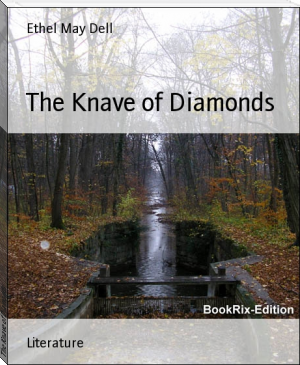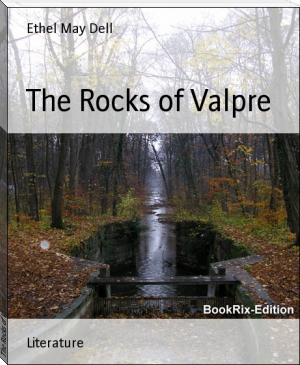The Swindler by Ethel May Dell (books to read for teens .TXT) 📖

- Author: Ethel May Dell
Book online «The Swindler by Ethel May Dell (books to read for teens .TXT) 📖». Author Ethel May Dell
His blue eyes looked straight at Archie with a stare that was openly supercilious, and Archie stood abashed.
"You--you are awfully good," he stammered at length.
West's brief laugh lived in his memory for long after. It held an indescribable sting, almost as if the man resented something. Yet the next moment unexpectedly he held out his hand.
"A matter of opinion," he observed drily. "Good-night! Remember what I have said to you."
"I shall never forget it," Archie said earnestly.
He wrung the extended hand hard, waited an instant, then, as West turned from him with that slight characteristic lift of the shoulders, he moved away and went below.
* * * * *
"I'd just like a little talk with you, Mr. West, if I may." Lightly the audacious voice arrested him, and, as it were, against his will, West stood still.
She was standing behind him in the morning sunshine, her hair blown all about her face, her grey eyes wide and daring, full of an alert friendliness that could not be ignored. She moved forward with her light, free step and stood beside him. West was smoking as usual. His expression was decidedly surly. Cynthia glanced at him once or twice before she spoke.
"You mustn't mind what I'm going to ask you," she said at length gently. "Now, Mr. West, what was it--exactly--that happened in the saloon last night? Surely you'll tell me by myself if I promise--honest Injun--not to tell again."
"Why should I tell you?" said West, in his brief, unfriendly style.
Cynthia was undaunted. "Because you're a gentleman," she said boldly.
He shrugged his shoulders. "I don't know what reason I have given you to say so."
"No?" She looked at him with a funny little smile. "Well then, I just feel it in my bones; and nothing you do or leave undone will make me believe the contrary."
"Much obliged to you," said West. His blue eyes were staring straight out over the sea to the long, blue sky-line. He seemed too absorbed in what he saw to pay much attention to the girl beside him.
But she was not to be shaken off. "Mr. West," she began again, breaking in upon his silence, "do you know what they are saying about you to-day?"
"Haven't an idea."
"No," she said. "And I don't suppose you care either. But I care. It matters a lot to me."
"Don't see how," threw in West.
He turned in his abrupt, disconcerting way, and gave her a piercing look. She averted her face instantly, but he had caught her unawares.
"Good heavens!" he said. "What's the matter?"
"Nothing," she returned, with a sort of choked vehemence. "There's nothing the matter with me. Only I'm feeling badly about--about what I asked you to do yesterday. I'd sooner have lost every dollar I have in the world, if I had only known, than--than have you do--what you did."
"Good heavens!" West said again.
He waited a little then, looking down at her as she leaned upon the rail with downcast face. At length, as she did not raise her head, he addressed her for the first time on his own initiative:
"Miss Mortimer!"
She made a slight movement to indicate that she was listening, but she remained gazing down into the green and white of the racing water.
Unconsciously he moved a little nearer to her. "There is no occasion for you to feel badly," he said. "I had my own reasons for what I did. It doesn't much matter what they were. But let me tell you for your comfort that neither socially nor professionally has it done me any harm."
"They are all saying: 'Set a thief to catch a thief,'" she interposed, with something like a sob in her voice.
"They can say what they like."
West's tone expressed the most stoical indifference, but she would not be comforted.
"If only I hadn't--asked you to!" she murmured.
He made his peculiar, shrugging gesture. "What does it matter? Moreover, what you asked of me was something quite apart from this. It had nothing whatever to do with it."
She stood up sharply at that, and faced him with burning eyes. "Oh, don't tell me that lie!" she exclaimed passionately. "I'm not such a child as to be taken in by it. You don't deceive me at all, Mr. West. I know as well as you do--better--that the man who did the swindling last night was not you. And I'm sick--I'm downright sick--whenever I think of it!"
West's expression changed slightly as he looked at her. He seemed to regard her as a doctor regards the patient for whom he contemplates a change of treatment.
"See here," he abruptly said. "You are distressing yourself all to no purpose. If you will promise to keep it secret, I'll tell you the facts of the case."
Cynthia's face changed also. She caught eagerly at the suggestion. "Yes?" she said. "Yes? I promise, of course. And I'm quite trustworthy."
"I believe you are," he said, with a grim smile. "Well, the fact of the matter is this. The man we want is on board this ship, but being only a private detective, I don't possess a warrant for his arrest. Therefore all I can do is to keep him in sight. And I can only do that by throwing him as far as possible off the scent. If he takes me for a card-sharper, all the better. For he's as slippery as an eel, and I have to play him pretty carefully."
He ceased. Cynthia's eyes were growing wider and wider.
"Nat Verney on board this ship?" she gasped.
He nodded.
"Yes. You wanted him to get away, didn't you? But I don't think he will, this time. He will probably be arrested directly we reach New York. But, meantime, I must watch out."
"Oh!" breathed Cynthia. "Then"--with sudden hope dawning in her eyes--"it really was your doing, that trick at the card-table last night?"
West uttered his brief, hard laugh.
"What do you take me for?"
She heaved a great sigh of relief.
"And it wasn't Archie, after all? I'm thankful you told me. I thought--I thought--But it doesn't matter, does it? Tell me, do tell me, Mr. West," drawing very close to him, "which--which is Mr. Nat Verney?"
West seemed to hesitate.
"Oh, do tell me!" she begged. "I know I'm only a woman, but I always keep my word. And it's only two days more to New York."
He looked closely into her eyes and yielded.
"I'm trusting you with my reputation," he said. "It's the stout, red-faced man called Rudd."
"Mr. Rudd?" She started back. "You don't say? That man?" There followed a short pause while she digested the information. Then, as on the previous morning, she suddenly extended her hand. "Well, I hate that man, anyway. And I believe you're really clever. If you like, Mr. West, I'll help you to watch out."
"Thanks!" said West. He took the little hand into a tight grip, still looking straight into her eyes. There was a light in his own that shone like a blue flame. "Thanks!" he said again, as he released it. "You're very good, Miss Mortimer. But you mustn't be seen with me, you know. You've got to remember that I'm a swindler."
The girl laughed aloud. It pleased her to feel that this taciturn man had taken her into his confidence at last. "I shall remember," she said lightly.
And she went away, not only comforted, but gay of heart.
* * * * *
During the remainder of the voyage, West was treated with extreme coolness by every one. It did not seem to abash him in the least. He came and went in the crowd with the utmost _sang-froid_, always preoccupied, always self-contained. Cynthia observed him from a distance with admiration. The man had taken her fancy. She was keenly interested in his methods, as well as in his decidedly unusual personality. She observed Rudd also, and noted the obvious suspicion with which he regarded West. On the night before their arrival she saw the latter alone for a moment, and whispered to him that Mr. Rudd seemed uneasy. At which information West merely laughed sardonically. He was holding a small parcel, to which, after a moment, he drew her attention.
"I was going to ask you to accept this," he said. "It is nothing very important, but I should like you to have it. Don't open it before to-morrow."
"What is it?" asked Cynthia, in surprise.
He frowned in his abrupt way.
"It doesn't matter; something connected with my profession. I shouldn't give it you, if I didn't know you were to be trusted."
"But--but"--she hesitated a little--"ought I to take it?"
He raised his shoulders.
"I shall give it to the captain for you, if you don't. But I would rather give it to you direct."
In face of this, Cynthia yielded, feeling as if he compelled her.
"But mayn't I open it?"
"No." West's eyes held hers for a second. "Not till to-morrow. And, in case we don't meet again, I'll say good-bye."
"But we shall meet in New York?" she urged, with a sudden sense of loss. "Or perhaps in Boston? My father would really like to meet you."
"Much obliged," said West, with his grim smile. "But I'm not much of a society man. And I don't think I shall find myself in Boston at present."
"Then--then--I sha'n't see you again--ever?" Cynthia's tone was unconsciously tragic. Till that moment she had scarcely realised how curiously strong an attraction this man held for her.
West's expression changed. His emotionless blue eyes became suddenly more blue, and intense with a vital fire. He leaned towards her as one on the verge of vehement speech.
Then abruptly his look went beyond her, and he checked himself.
"Who knows?" he said carelessly. "Good-bye for the present, anyway! It's been a pleasant voyage."
He straightened himself with the words, nodded, and turned aside without so much as touching her hand.
And Cynthia, glancing round with an instinctive feeling of discomfiture, saw Rudd with another man, standing watching them at the end of the passage.
* * * * *
In the dark of early morning they reached New York. Most of the passengers decided to remain on board for breakfast, which was served at an early hour in the midst of a hubbub and turmoil indescribable.
Cynthia, with her aunt and Archie, partook of a hurried meal in the thick of the ever-shifting crowd. She looked in vain for West, her grey eyes searching perpetually.
One friend after another came up to bid them good-bye, stood a little, talking, and presently drifted away. The whole ship from end to end hummed like a hive of bees.
She was glad when at length she was able to escape from the noisy saloon. She had not slept well, and her nerves were on edge. The memory of that interrupted conversation with West, of the confidence unspoken, went with her continually. She had an almost feverish longing to see him once more,
 Have you ever thought about what fiction is? Probably, such a question may seem surprising: and so everything is clear. Every person throughout his life has to repeatedly create the works he needs for specific purposes - statements, autobiographies, dictations - using not gypsum or clay, not musical notes, not paints, but just a word. At the same time, almost every person will be very surprised if he is told that he thereby created a work of fiction, which is very different from visual art, music and sculpture making. However, everyone understands that a student's essay or dictation is fundamentally different from novels, short stories, news that are created by professional writers. In the works of professionals there is the most important difference - excogitation. But, oddly enough, in a school literature course, you don’t realize the full power of fiction. So using our website in your free time discover fiction for yourself.
Have you ever thought about what fiction is? Probably, such a question may seem surprising: and so everything is clear. Every person throughout his life has to repeatedly create the works he needs for specific purposes - statements, autobiographies, dictations - using not gypsum or clay, not musical notes, not paints, but just a word. At the same time, almost every person will be very surprised if he is told that he thereby created a work of fiction, which is very different from visual art, music and sculpture making. However, everyone understands that a student's essay or dictation is fundamentally different from novels, short stories, news that are created by professional writers. In the works of professionals there is the most important difference - excogitation. But, oddly enough, in a school literature course, you don’t realize the full power of fiction. So using our website in your free time discover fiction for yourself. 




Comments (0)